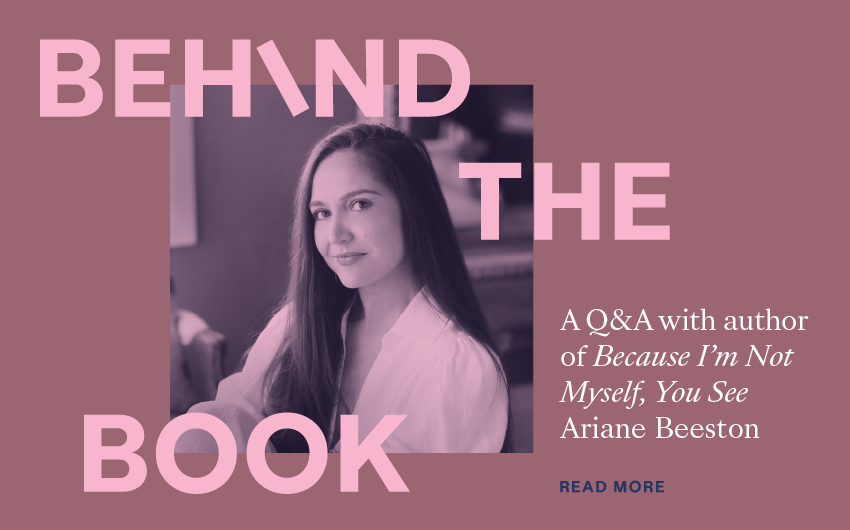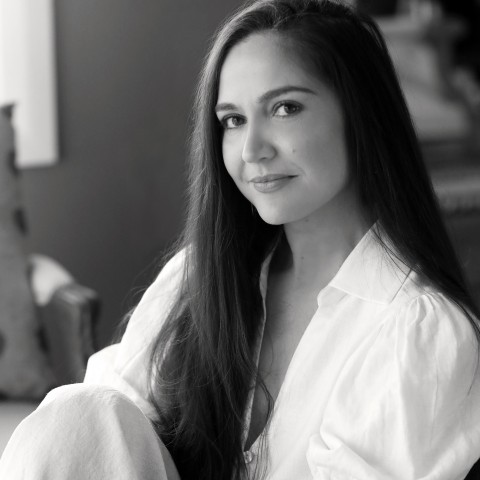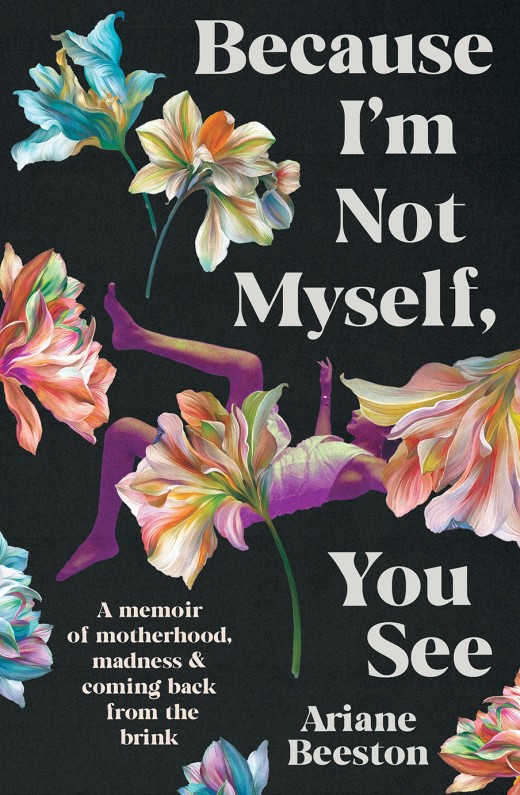News

News >
A Q&A with Because I’m Not Myself, You See author Ariane Beeston
Welcome back to Behind the Book. In this series, we chat to the people who bring you the books you love from Black Inc. – from the names you may know to those you definitely don’t.
This month, we spoke to Ariane Beeston, author of the forthcoming Because I’m Not Myself, You See – a memoir of postpartum psychosis and coming back from the brink. In this interview, Ariane touches on the experiences that compelled her to write a memoir, protecting her mental health throughout the writing process, and how she’s feeling ahead of her book’s release in May.
Ariane Beeston is a former child protection caseworker and psychologist with NSW’s Department of Communities and Justice. She was a staff writer at Fairfax Media’s Essential Baby and Essential Kids, and has also published articles in The Sydney Morning Herald, Daily Life, Babyology and Mamamia. Ariane currently works for Australia’s peak body in perinatal mental health, The Centre of Perinatal Excellence (COPE), as their Communications and Content Manager. She is also a dancer and choreographer.
What compelled you to write your memoir Because I’m Not Myself, You See, and how did it come to be published by Black Inc.?
The idea for the memoir came when I was sitting in the mother and baby psychiatric ward, nine months postpartum – stunned, exhausted and feeling desperately alone. When I went looking for something to read about motherhood and severe mental illness (the kind that puts you in a psych ward), I couldn't find anything. I also couldn’t find much about what it was like to be a mental health professional with a mental illness. “I’m going to write about this one day,” I said during a group therapy session one morning while on the ward. “Because no one told me about any of this.”
And so, I wrote the book I needed to read when I was unwell.
It took me several years to feel emotionally robust enough to start writing and reliving that time of my life. I wrote a proposal and completed some sample chapters, which my agent sent to Black Inc. I loved Jenny Valentish’s Woman of Substances, Jess Hill’s incredible See What You Made Me Do and Lech Blaine’s Car Crash, and felt my proposal might be a good fit. Thankfully, my now-publisher Sophy Williams agreed! I was so lucky that Sophy immediately saw what I was trying to achieve, using my own story to talk about perinatal mental health in this country more broadly, and exploring the gaps that existed then and now. She was so enthusiastic from day one – I knew my book had found the perfect home.
Because I’m Not Myself, You See documents your experience of, and recovery from, postpartum psychosis. You’re incredibly generous in the intimate details you share from this period of illness. What was it like to put those thoughts and experiences to paper for others to read? How did you protect your mental health throughout the writing process?
There’s a prevailing belief that writing is or should be cathartic but I don’t think that’s always the case. I certainly found it incredibly taxing to dig through the memories and flashbacks from this period of my life and to write about them so candidly. People often say about my writing, “You’re so honest,” and I am! But I just didn’t think there was any other way to share this story other than in a memoir. (Trust me, I tried to fictionalise it like The Bell Jar, but the truth just kept butting in.)
While writing, I continued to see my psychiatrist (Dr Q, who you’ll meet in the book!). There was a lovely symmetry about having seen her in my postpartum years and again while reliving that time. I also wasn’t afraid to tell my editors when I was finding it tough, and I asked for a few extra days here and there when I was feeling a bit wobbly. I wrote an entire memoir about not asking for help when I needed it, so I wasn’t going to make that mistake again!
This is your first book. Is there a particular part of the publishing process that you’ve loved or hated the most so far?
I think the hardest part was getting that first draft written. There was a lot of googling “how does one write a memoir?” and buying books on craft (I’m talking Annie Dillard and Stephen King, not glue and glitter. There’s a whole chapter in my book called ‘If They Make Me Do Art Therapy’). I wrote the first draft quickly (over about six months) and it was pretty average. But everyone said it would be and to just get it done.
I have loved the editing process perhaps more than I expected. My editors Jo and Beck have been so patient, insightful and generous with an absolute novice, and I’ve loved watching the mess I first filed take shape with their guidance. There’s something so satisfying about being at the stage where you’re considering individual words or the rhythm of sentences, knowing it will never ever be perfect but hoping to get it as close as possible.
The book is now available for pre-order and about to go to print, but it won’t be released until late May. How are you finding this limbo period? Are you taking it as a breather, or do you feel like you’re holding your breath?
As I write, I am still working on the final copy edits, which is both exciting and terrifying. I’ve also had some wonderful feedback from early readers which has helped immensely on this home stretch. I am so excited and so very proud and I can’t wait for the memoir to be out in the world in May and in the hands of readers.
What message do you hope readers will take away from Because I’m Not Myself, You See?
Most of us will struggle in some way on the transition to motherhood, which we also call matrescence. While my own experience with postpartum psychosis is rare, other topics that I cover in the book – postnatal depression and anxiety, the immense toll sleep-deprivation can take, body image during pregnancy and after having a baby, breastfeeding difficulties and the changes to your relationship – are far more common, but still often take people by surprise.
I hope readers take some comfort in seeing aspects of their own experience reflected on the page – whether they became a parent last week or decades ago. I also hope it’s the sort of book you might be able to pass to someone and say, “This is what it was like for me! This is what I couldn’t put into words.”
It can be a lonely and cruel experience to be so unwell during what’s supposed to be “the happiest time of your life”.
I hope this book shows mothers who may be suffering, or their loved ones, that recovery from severe perinatal mental illness is possible – and that life on the other side can be full of purpose and joy.
Read the previous instalment of Behind the Book, a Q&A with literary agent Margaret Gee.
To stay in the loop with Behind the Book, join the Friends of Black Inc. mailing list.
Share this post
About the author
Ariane Beeston is a former child protection caseworker and psychologist. She was a staff writer at Fairfax Media's Essential Baby and Essential Kids and has also published articles in The Sydney Morning Herald, Daily Life, Babyology and Mamamia. Ariane currently works for Australia's peak body in perinatal mental health, The Centre of Perinatal Excellence (COPE). Her first book, Because I'm Not Myself, You See, was shortlisted for the Matt Richell Award …
More about Ariane Beeston




